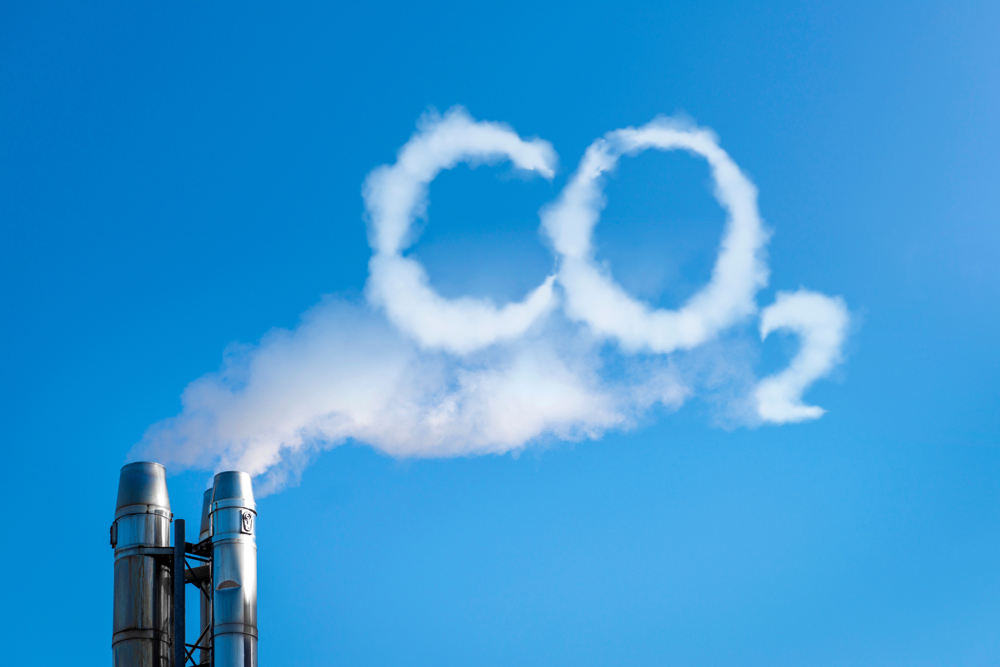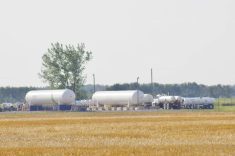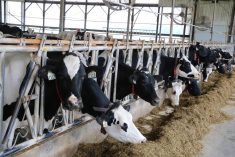The Keystone Agricultural Producers (KAP) is calling on federal agriculture minister Marie-Claude Bibeau to “support farmers and stand up to her government’s recently announced carbon tax increase.”

“Putting in place an exemption for fuel used for drying grain and heating and cooling barns, just like the one in place for greenhouses, is a start,” KAP president Bill Campbell said in a news release Dec. 21. “We also need recognition that carbon tax costs are embedded in every aspect of the food supply chain, from inputs to production to marketing, and the proposed tax increase will put unnecessary pressure on farmers and consumers.”
While the fuel farms use in their equipment such as tractors and combines are carbon tax exempt, it doesn’t apply to grain drying or heating barns.
To discourage carbon emissions and mitigate climate change the federal government announced Dec. 11 it will increase the carbon tax to $170 a tonne by 2030.
Read Also

Mazergroup’s Bob Mazer dies
Mazergroup’s Bob Mazer, who helped grow his family’s company into a string of farm equipment dealerships and the main dealer for New Holland machinery in Saskatchewan and Manitoba, died July 6 from cancer.
The current tax will hit $50 a tonne in 2022 and then jump $15 a tonne annually until 2030.
Ottawa says citizens will get quarterly rebates to offset some of the increased costs resulting from the tax.
“What is also missing from this announcement is recognition of the climate benefits that farmers provide every day, including carbon storage and green house gas mitigation,” said Campbell.
The National Inventory Report (NIR) is a way of accounting for emissions and reductions but doesn’t include land use, land use changes, and forestry in agriculture’s emissions totals, which could make them lower.
Farmers manage nutrients by following regulations and using enhanced higher efficiency, higher cost fertilizer without credit, the release says.
“The fact is that farmers store carbon short term in their products and long term in their soil, and thanks to good management practices and new technology, emissions intensity in agriculture has improved year after year,” Campbell said.
The statement alludes to the fact that farmers store carbon in their soil when they sow land to permanent cover but carbon is released when people and animals eat.
The carbon tax issue is important to Manitoba farmers generating much heated discussion, but KAP says it’s making progress.
In February, KAP met with federal officials, including Conservative MP Philip Lawrence, who tabled a private members bill, to amend the Greenhouse Gas Pollution Pricing Act (qualifying farming fuel).
“We see cross-party support for this bill and we are hopeful that the Liberal government will show their support for farmers by passing this bill,” Campbell said.
In July, KAP told Bibeau the carbon tax added 22 per cent to a chicken producer’s natural gas bill.
The carbon tax also cost corn growers between $2.13 to $4.42 an acre to dry corn in 2019, adding five per cent to the bill, a KAP official said in an interview in November.
KAP wants the federal and Manitoba governments to co-ordinate their climate change mitigation efforts.
In March the Manitoba government announced a green levy effective July 1 in conjunction with a one per cent drop in Manitoba’s provincial sales tax, which would have exempted fuel for grain drying and barns. However, it was deferred due to COVID-19.
“We need to see these efforts come to fruition and for the provincial and federal governments to figure out solutions that better support farmers as climate stewards,” Campbell said.
The federal government intends to spend some of the carbon tax revenue to hep farmers use new technology to cut their carbon emissions, Bibeau told reporters Dec. 15.
Ottawa’s plan calls for investment of $165.7 million over seven years to support the agricultural industry develop “transformative clean technologies” and to help farmers adopt “commercially available clean technology.”
“Besides this fund we have also announced in this plan… more than $350 million through the National Climate Solutions and the Agriculture Clean Technology programs so there are a lot of programs to help farmers access these new technologies,” Bibeau said. “The ‘living labs’ is a good example.
“Through the same plan there will be a lot of support for farmers.”
The government is also considering “border carbon adjustment” to keep Canada competitive.
“Border carbon adjustments level the playing field across jurisdictions: they put a carbon fee on imports from countries that either do not have carbon pricing or price it too low so that those products face the same costs as those supplied by domestic producers who pay a price on carbon pollution,” the government’s update climate plan report says. “As such, border carbon adjustments can help maintain competitiveness while also encouraging other countries to step up and take effective action to reduce emissions.
“The Government of Canada will work with like-minded economies, including the European Union and Canada’s North American partners to consider how this approach could fit into the broader strategy to meet climate targets while ensuring a fair environment for businesses.”
The report doesn’t say if such a policy is permissible under world trade rules.
The strategy would presumably raise prices for Canadian consumers buying those taxed imports.
The report doesn’t explain how applying a carbon tax on imports would make Canadian exports, including grain, more competitive.



















